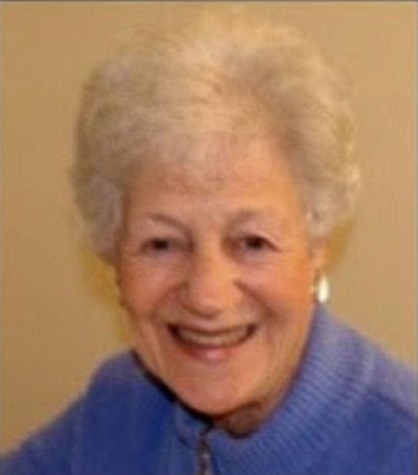Holocaust survivor tells story at Bishop Noll in Diocesan event
April 29, 2016

On April 25, Bishop Noll Institute welcomed holocaust survivor, Beatrice Muchman to tell her life story in Noll’s auditorium.
The rise of the Nazi party began when Muchman was a young girl and she and her family left their home in Berlin, Germany and fled to Brussels, Belgium. Muchman’s parents realized the great danger of the Nazis and knew they needed to protect their daughter–Beatrice. Muchman’s parents courageously arranged for Beatrice and her cousin to seek refuge in a small town in Belgium. There, she and her cousin hid from the Nazis, living a quiet life and converting to Catholicism.
Beatrice and her cousin were fortunate and survived. Her parents, however, were not as fortunate. Muchman’s mother died in a concentration camp and her father was murdered while trying to escape arrest. For years Muchman believed her parents abandoned her, until she found a box filled with letters. Within those letters, Beatrice learned the love from her parents and the awful truth of the Holocaust.
Today, Muchman lives in the United States. She settled into Chicago’s Hyde Park neighborhood, graduated from Hyde Park High School in 1951, attended the University of Illinois, married, raised a family, and taught French at Forest Ridge in Schererville from 1982 to 1987
Director of Gary, Kevin Driscoll organized this event and was inspired by Muchman’s words when he saw her speak at Forest Ridge. During that time, Driscoll was in search of Holocaust guest speakers to give a learning experience to those participating in the Diocesan World Youth Day pilgrimage. The World Youth Day pilgrimage is a pilgrimage in which people take the opportunity of a spiritual journey, bringing themselves in a closer relationship with God. These travelers will attend Poland in the summer and Auschwitz is one of the places they will visit.. The travelers will tour the concentration camp of Auschwitz-Birkenau in July, the same concentration camp where Beatrice’s mother was slaughtered.
“Our faith teaches us that every human life is created by God and should be valued,” said Driscoll. “The holocaust shows us the danger that happens when one man does not value the human dignity of another.”
Driscoll miraculous landed upon a Northwest Indiana Times article about Beatrice speaking at Forest Ridge. The moment he heard her story, he knew she was the perfect candidate to inspire not only those going on the pilgrimage, but for every individual person.
According to Driscoll, superintendent of Catholic Schools, Dr. Barbara O’Block, recommended Noll’s theater because “its capacity provides enough space and a great environment.” It was also convenient for Beatrice who lives on Chicago’s north side, with it being a shorter drive transporting Beatrice to and from this event.
President of Bishop Noll, Paul Mullaney, believes that this event was a wonderful learning opportunity for Noll students.
“Our students [had] a very rare opportunity to see and hear Beatrice Muchman, and this intersection of lessons in history and morals [fit] hand-in-glove into our mission as a Catholic school,” Mullaney said. “[Muchman’s] story [brought] history alive at our school, recounting one of the greatest atrocities known to the human race.”
Driscoll believes this event reached out to people and addressed the issue of hatred and violence in the world, and allowed everyone to join together to fight against it. Driscoll connected this with our world today, in which there are terrorist attacks occurring worldwide.
“Most Holocaust survivors struggle to forgive the Germans for the atrocities of the greatest mass killing in human history,” Driscoll said. “Most Americans today could never imagine having their families torn apart and their lives extinguished, simply because of their race. Learning about Beatrice’s story will make anyone have a greater appreciation for his or her blessings. It’s natural to take life for granted, but to know Beatrice is to know how precious and fragile life really is.”
If you would like to learn more of Beatrice’s story, read her book, “Never To Be Forgotten: A Young Girl’s Holocaust Memoir.”
